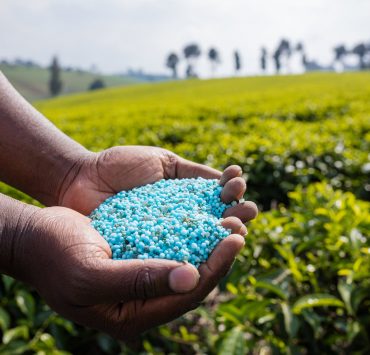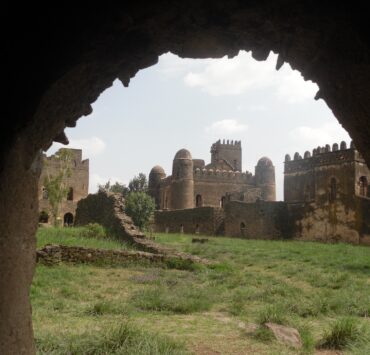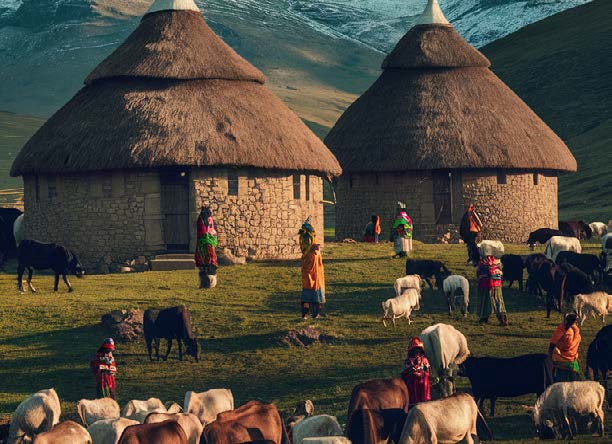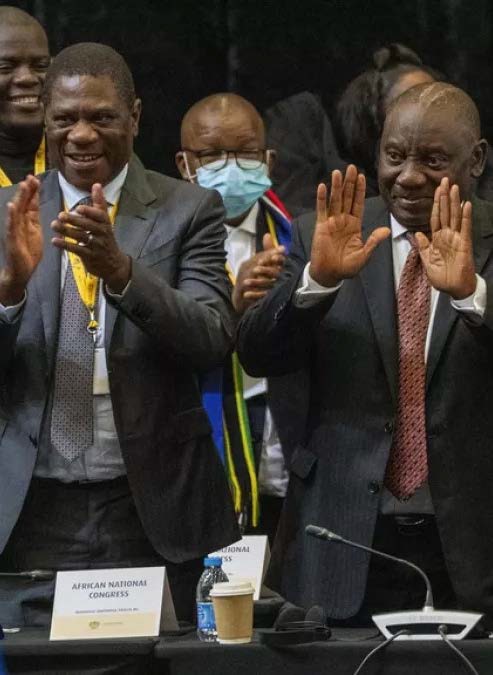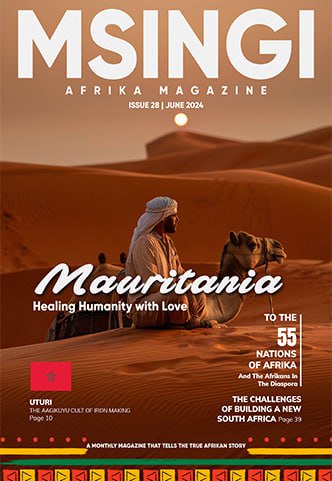Nation Building in the Hands of Irresponsible Builders

Samuel Phillips is a writer, graphic designer, photographer, songwriter, singer…
“Nothing wrong with having GMO foods, we’ll still die.”
“Being in this country you are a candidate for death and because many things are competing for death in this country, there is nothing wrong with adding GMOs to that list”
Pause for a minute and think about the above statements. Can you guess who made these reckless statements? A comedian maybe? Or a representative of a foreign corporation that deals in GMO product distribution? Or maybe one of those false NGOs that are bent on fulfilling their eugenics depopulation agendas in Afrika? Or maybe just some nonentity walking on the street of Nairobi. None of the above. The statement was made by Moses Kuria, the new Kenyan cabinet secretary for trade.
His words may have been said with a light touch or as some sort of joke, but the ideology is quite clear. It simply means, as long as we all will die someday, why worry about whether GMOs can cause death? But that’s a very reckless and unkind statement to make in a public function. It’s like saying “oh ye 50 million Kenyans and the citizens of other nations living in Kenya, your lives are worth nothing more than some grains of GMO maize”. I thought the government’s primary duty is to protect its citizens’ lives and properties. Clearly, some sections of this Kenyan government did not seem to get the memo right. And there lies the problem.
I can say categorically that I smell a very fat dead rat in all of these GMO narratives going on right now in Kenya. And to think that Bill Gates, who is a well-known proponent and funder of GMO projects through his Gates Foundation and his many other proxy NGOs, was in Kenya at the very same time that Moses Kuria was speaking. Only a dummy should not be able to put together the narrative and how flawed it all is. In fact, Bill Gates was on record in Kenya saying that every piece of bread he eats and all the maize he eats are genetically modified. I wonder if that’s his way of saying, Moses Kuria you are on the right track, your people just need to get it that even I, who is one of the richest men in the world, eat GMOs.
A few days after that unhealthy remark from Mr. Moses Kuria, the leader of the opposition, Hon Raila Odinga released a couple of statements, and one of the things he said about GMOs caught my attention. He said “These foods pose a direct threat to our health, our farmers, soils, institutions, and seeds. GMOs are a new form of colonialism that will leave us permanently at the mercy of malign foreign nations and greedy corporations. Simply put, GMOs are an existential threat to Kenya’s food systems, ecosystems, and its human and plant life,”.
While his comments may be accurate, I, however, find some level of inconsistencies in Mr Raila Odinga’s anti-GMO narrative. It’s on record that in 2011, Mr Raila had opposed those who were anti-GMO and even called them those with “a narrow understanding of genetic modification of crops.”. Could it be that Mr Raila has, over the years, seen the possible dangers involved in GMOs and thus his new approach to the topic? Or is he just being an opposition leader who wants to do what opposition parties do in politics and try to gain some brownie points with the electorate? Whichever one it is, I think Kenyans themselves and the larger Afrikan populace should by now be able to decide what they want as food. And speaking of what Kenyans are thinking about the GMO story, here is what someone said in a Facebook post:

“Kenya needs to be wary of Bill Gates and Moses Kuria.
Bill Gates is eager to advance his GMO agenda because Kenya is the last frontier to his pet project of having GMOs the world over. I noticed Gates didn’t even talk about his Microsoft company on how it can partner with Kenyan schools on helping our young generation to be tech savvy! All he cared for was his GMO agenda. The fact that the government seemed to eager to grant him audience shouldn’t mean that we are boarding his nonsense.
Moses Kuria should be told he’s the head of a very crucial ministry and he’s no longer an MP. His mouth is way to loose and it’s like he’s not aware that any word that comes out of his mouth can be construed to be government policy! It’s worrying that his latest outbursts have been geared towards mocking Kenyans and trivializing the debate on GMOs.”
Now, if Mr Raila Odinga, whom you will like to call the generation of old politicians, (or whoever is pulling the strings behind him) knows about the health effect of GMOs on humans and the ecosystem, how for heaven’s sake is Moses Kuria, a much younger politician ignorant of the same? Or is this just a case of trying to use GMO corn to save face for the new administration, since they made campaign promises of making the cost of living cheaper for Kenyans in a hundred-day timeline? Whichever one it is, no one has the right to play with or make a mockery of the lives of others.
GMOs and the death trade
Outside of those who are deeply involved in the agenda to control the world, outside of those who have hidden agendas to create a world whose food sources are dependent on some few corporations, and outside of those false researchers who are controlled by their stomachs, are there really people out there who would want to walk away from organic food products and then embrace GMOs? I wrote an article about the health effects of eating GMOs, so I won’t be repeating myself in this article. But let me quickly point this out.
More than 93 percent of the corn and soy planted in the United States is genetically modified in some way. Most of that ends up as animal feed, ethanol, or corn syrup — and corn syrup gets into lots of foods. Cotton, sugar beets, and canola are also common genetically modified crops. Roughly about 60 to 70 percent of processed foods in grocery stores contain at least some genetically modified ingredients.
Do you know how much the annual US budget is for healthcare? According to www.healthsystemtracker.org, Health spending totaled $74.1 billion in 1970. By 2000, health expenditures had reached about $1.4 trillion, and in 2020 the amount spent on health tripled to $4.1 trillion. Health spending increased by 9.7% from 2019 to 2020, much faster than the 4.3% increase from 2018 to 2019. The average annual growth in health spending from 2010-2019 was 4.2%. Total health expenditures represent the amount spent on health care and related activities (such as administration of insurance, health research, and public health), including expenditures from both public and private funds.
The USA health care budget for 2023 is 9.70 trillion dollars. Now ask yourself how much is the total annual budget of all African countries combined. Your answer will show you something very critical. That the US spends such whopping amounts on health care alone is not a sign of a rich and developed country, it’s a sign of a very sick and dying nation. Why would you need such an amount of money for healthcare if your people are healthy? Except maybe a huge part of that money is for preventive medicine which could include programs that offer healthy lifestyles and healthy natural food, but I doubt that that’s the case. In fact, from a newsletter shared by filmmaker and journalist Jonathan Otto, “We’re in the midst of the sixth extinction right now. Right now, one in every three of our males are infertile. One in every four of our females. “Do you understand that in 1965, 4% of the United States population had a chronic disease? And then, in 2010, HHS did a study and showed that 54% of our children now have a chronic disease.” these comments on the state of health in the US were attributed to Christopher Key, founder of vaccine-police.com. Otto goes on to add that, “This percentage will be close to 80% today. But, is it all coincidence? Experts don’t think so, and there’s enough evidence that this was premeditated.”
Since the American health system is deeply eaten up by the murderous big pharmaceuticals and since it’s on record that America has the largest percentage of GMO usage and consumption globally, and a population in such a terrible state of health, then such a large healthcare budget will definitely not be for healthy lifestyles and natural non-GMO foods, but for diseases. However, my concern is, is this the direction we want Afrikans to go in, in the name of development, food security, and technology?
There are lots of unintended consequences that come with GMO crops, usage and consumption. So it’s not just about the danger of GMO food on humans but also about the environmental effects it has. I saw this report on the unintended consequence of GMO on a website called discoveryeye.org. It reads, “The unintended environmental risks of genetically modified crops include herbicide and insecticide resistance, gene transfer to wild and conventionally grown plants through cross-pollination, crops that are too genetically uniform and thus susceptible to being wiped out by disease, farmer’s limited access to seeds due to patenting of genetically modified food plants, and hard to eradicate “superweeds. “As just one example of the unintended environmental consequences of genetically modified food, Bt corn has been genetically modified to create a toxin in the pollen which kills the European Corn Borer. However, when the pollen is disbursed by the wind, it can land on milkweed, the food plant of the Monarch butterfly, killing the caterpillars that feed on the milkweed. This is one of the reasons the Monarch butterfly population has decreased in recent years.”
Irresponsibility leads to poverty
We must tell ourselves the truth as Afrikans that we have too many irresponsible leaders in our various arms of government who are acting like they are controlled by some unseen forces. So we keep forgetting that irresponsibility leads to wastage and wastage leads to poverty. That means if you want to know why Afrika is “poor”, take a look at the level of irresponsibility among its leaders and even Afrikans themselves and you will get your answer.
I have written about this issue before in a previous article about how wastage is a major cause of poverty in Afrika. But when you look at wastage from a clear perspective, you instantly see that wastage is caused by a lack of responsibility to ensure that resources are used responsibly. Let me share a good example with you.
I was going out a few days ago, just walking on the street to get a few things around the neighborhood. I noticed that the street lights were on and this was almost 10 in the morning. In fact, those street lights have remained on all day and all night for months but I had never had an opportunity to ask anyone why. So, as I walked on this morning, I saw the Kenya Power (electricity company) maintenance truck close to one of the transformers that serve the area. A crew of about six men had come to fix some issues that occurred the previous day. A man, whom I assume is their supervisor, greeted me as I passed him. I responded and then it came to mind that I should ask him about the lights. So, I asked him why the lights are on. He responded and said that the lights are on because the sensors are not working. I then asked him what was wrong with the sensors. He said there is dust on the sensors, so they could not tell if it was daytime or nighttime so the lights stay on day and night. Then I asked him if he is aware that the lights being on all day is a waste of energy. He said yes, it’s a waste of energy. And that was it. He walked away as if he and his crew are not the ones responsible for making sure the sensors of the streetlights are clean and in working condition. But do you see how he equates the sensors not working with his own act of irresponsibility toward making sure the sensors are cleaned? Meaning the sensors are working but the man and his crew that are paid to make sure they function as they should, are too busy with other things.
Just imagine that scenario for a moment and tell me what you think. How could dust be the reason for such an amount of wastage? I am talking about street lights that cover more than a two kilometer stretch of road. But that seems to be the problem with Afrika. The irresponsibility and the don’t-care attitude of those paid to take care of society.
There are countries in Afrika that do not have enough power to go around for everyone for whatever reasons, but here we are, staring at a very glaring case of power wastage in the same Afrika. You might say it’s just a little issue of streetlights, but that’s how it becomes a major issue that will require more resources to fix later.
Please take responsibility
We all have our duties and responsibilities in regard to making sure our nations and communities are run well. But when we leave those responsibilities unattended and then expect some positive changes to happen for us, then we are delusional. I may not be in the food or electricity sectors and thus my responsibility is not within those areas, but what about the media sector that I belong to, which requires me to be forthcoming with accurate information and thoughts that are useful for the general good?
Be responsible by responding to your abilities to make change.
What's Your Reaction?
Samuel Phillips is a writer, graphic designer, photographer, songwriter, singer and a lover of God. As an Afrikan content creator, he is passionate about creating a better image and positive narrative about Afrika and Afrikans. He is a true Afrikan who believes that the true potential of Afrika and Afrikans can manifest through God and accurate collaborations between Afrikans. Afrika is the land of kings, emperors, original wisdom, ancient civilizations, great men and women and not some road-side-aid-begging poor third world continent that the world finds joy in undermining.









